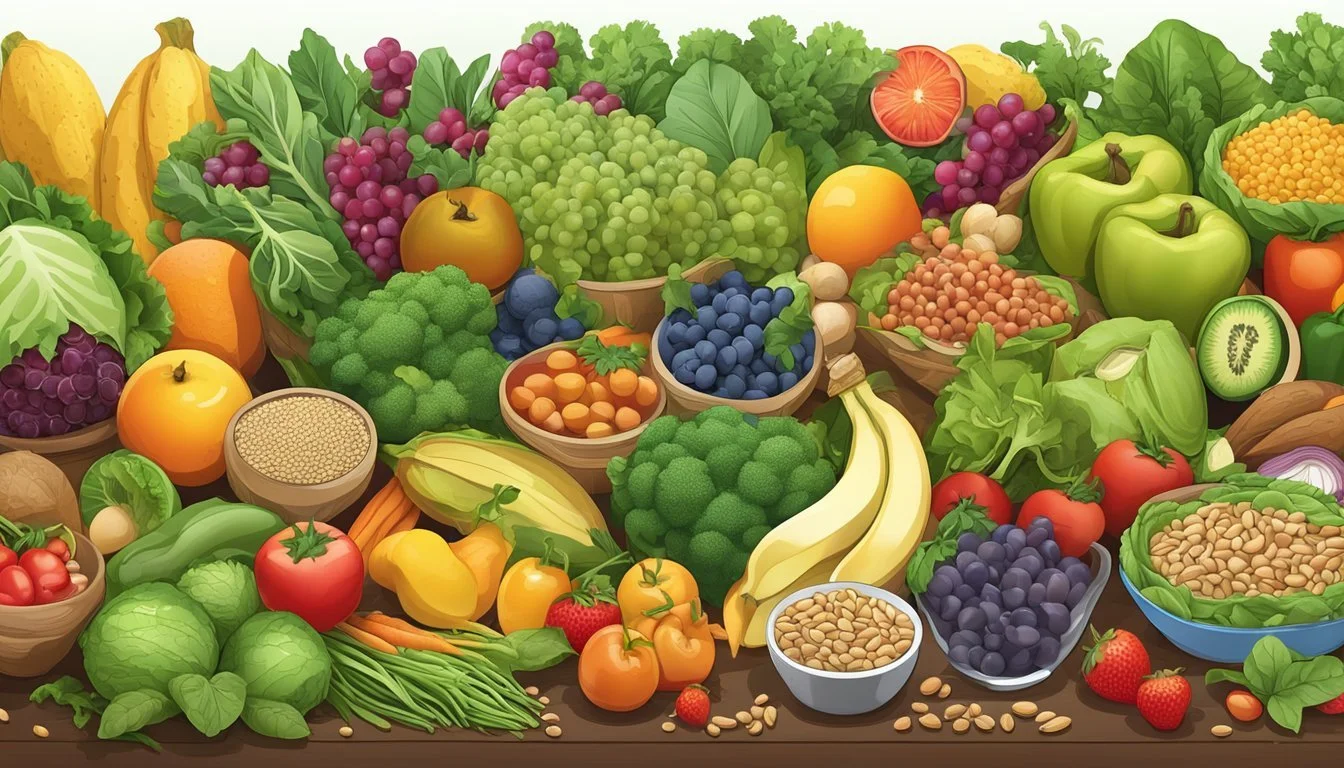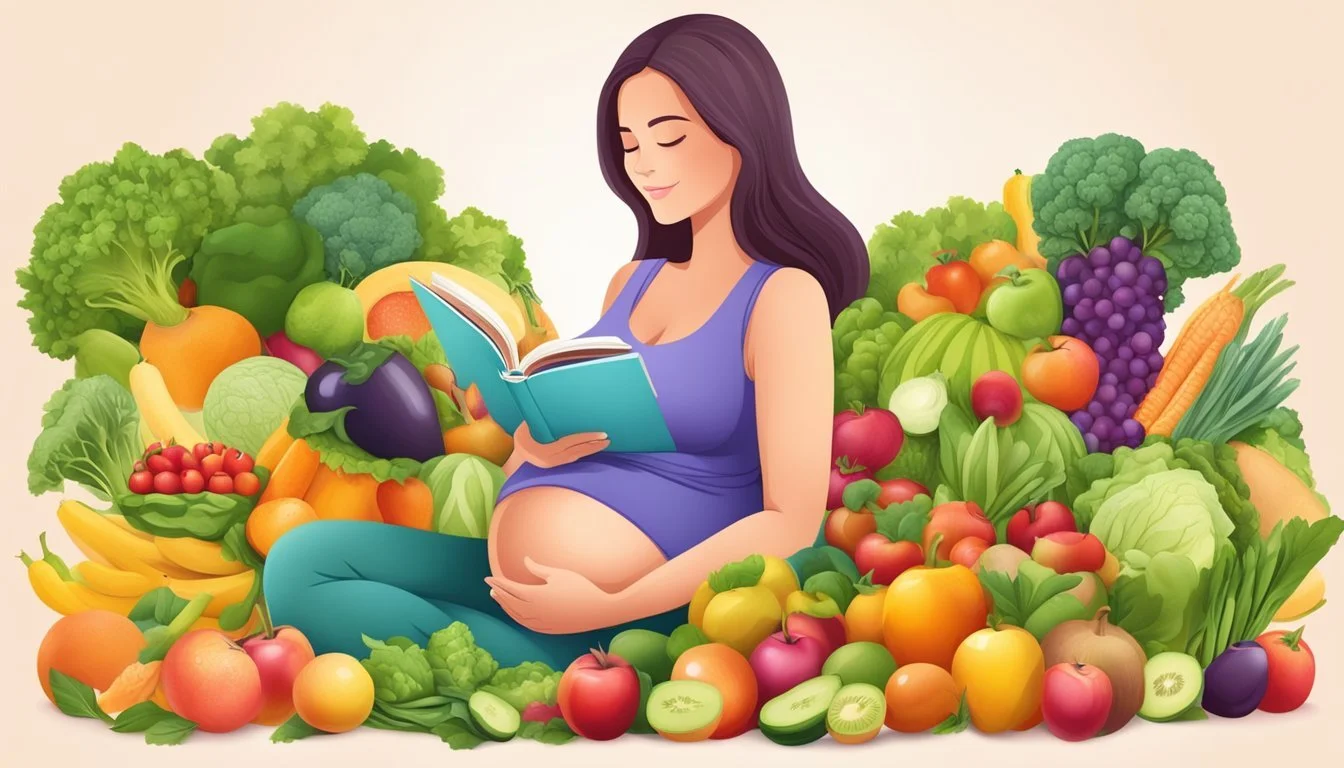Is it Safe to Follow a Vegetarian Diet While Pregnant?
Understanding Nutritional Needs
Maintaining a nutritious and balanced diet is essential during pregnancy, and this includes for those who follow vegetarian diets. A vegetarian diet, which traditionally excludes meat and sometimes other animal products, is generally considered safe during pregnancy, provided it includes a variety of foods that supply the necessary nutrients for both the mother and the developing baby. Pregnant individuals should ensure they consume enough protein, iron, calcium, vitamin D, and B12—nutrients that are often found in high amounts in animal products but can also be sourced from a well-planned vegetarian diet.
To ensure a healthy pregnancy, those following a vegetarian diet may include eggs and dairy products if they are not vegan, utilizing these as sources of protein and calcium. Vegans, on the other hand, should pay particular attention to their intake of vitamin B12, iron, and omega-3 fatty acids, which may require supplementation or the consumption of fortified foods. Health professionals often suggest that pregnant vegetarians and vegans consult with a dietitian to tailor a nutritional plan that meets all the requirements for a healthy pregnancy.
Careful planning and consideration of the body’s increased needs during pregnancy can make a vegetarian or vegan diet not only feasible but also beneficial. It is essential to combine a variety of protein sources, such as beans, lentils, tofu, and nuts, with whole grains and vegetables to ensure a comprehensive intake of essential amino acids. In addition, monitoring levels of key nutrients and adjusting the diet or adding supplements as advised by a healthcare provider can help maintain optimal health throughout pregnancy.
Understanding Vegetarian Diets in Pregnancy
When considering a vegetarian diet during pregnancy, it's vital to understand the types of vegetarian diets, the potential benefits for both mother and child, and the risks that could arise from inadequate nutrient intake.
Types of Vegetarian Diets
Lacto-ovo vegetarian: Includes dairy products and eggs but excludes meat, fish, and poultry.
Lacto vegetarian: Includes dairy products but excludes meat, fish, poultry, and eggs.
Vegan: Excludes all animal products, including dairy, eggs, and honey.
Benefits of Vegetarian Diets During Pregnancy
A vegetarian diet during pregnancy can be high in fiber, vitamins, and minerals, while being low in saturated fats. When well-planned, such a diet can support a healthy pregnancy and may:
Promote healthy weight gain: Due to high fiber content.
Offer antioxidants: Fruits and vegetables are rich in vitamins A, C, and E.
Reduce risk of certain diseases: Plant-based diets may lower the risk of heart disease, hypertension, and diabetes.
Potential Risks of Vegetarian Diets During Pregnancy
While vegetarian diets can be nutritionally sufficient, they may fall short on key nutrients vital for fetal development. A careful approach can mitigate these risks:
Protein: Essential for growth, particularly in the second and third trimesters.
Iron: Necessary for oxygen transport in the blood; plant-based iron is less easily absorbed.
Vitamin B12: Only found naturally in animal products, a deficiency can affect fetal brain development.
Calcium: Crucial for bone health, with fortified plant milks being a good source.
Omega-3 Fatty Acids: Important for brain development, with flaxseed and walnuts as plant-based sources.
A well-planned vegetarian or vegan diet requires a strong awareness for balancing nutrient intake to ensure a healthy pregnancy and lactation.
Nutritional Needs for a Healthy Pregnancy
During pregnancy, meeting nutritional needs is critical for the health of both the expecting mother and the developing fetus. A balanced intake of macronutrients and micronutrients supports vital functions and fetal development.
Macronutrients: Protein, Carbs, Fats
Protein is essential for the growth of fetal tissues, including the brain, and the expansion of the uterus and breast tissue. Pregnant individuals should aim for at least 75 grams per day. Plant-based sources include:
Legumes: lentils, chickpeas, and black beans
Whole grains: quinoa and oatmeal
Soy products: tofu, tempeh, and edamame
Carbohydrates provide energy and are found in fruits, vegetables, and whole grains. Whole grains are preferable because they also contribute fiber and additional nutrients.
Fats are pivotal for development, especially omega-3 fatty acids, which support fetal brain development. Sources of healthy fats include:
Nuts and seeds: chia seeds, flaxseeds, and walnuts
Avocado
Olive oil
Micronutrients: Vitamins and Minerals
Vitamins and minerals are crucial in smaller amounts, yet they play significant roles in a healthy pregnancy. Specific micronutrients include:
Folate (Vitamin B9): Supports neural tube development. Good sources are leafy greens and fortified cereals.
Calcium: Essential for fetal bone growth. Found in fortified plant milks and leafy greens.
Iron: Important for increasing the blood volume. Sources include legumes, fortified cereals, and spinach.
Vitamin B12: Works with folate and is often supplemented for those on a vegetarian diet.
Zinc: Supports immune function and cell division. Pumpkin seeds and lentils are good sources.
A prenatal supplement is often recommended to ensure all nutrient needs are met. Iron and B12 are particular concerns in vegetarian diets and may require extra attention or supplementation. Regular consultations with a healthcare provider can monitor nutrient levels and adjust dietary intake or supplements as necessary.
Important Vitamins and Minerals
When following a vegetarian diet during pregnancy, it is crucial to ensure adequate intake of certain vitamins and minerals that are vital for both maternal health and fetal development. Paying close attention to these nutrients can help mitigate the risks of dietary deficiencies.
Iron and Its Significance
Iron is essential for the production of hemoglobin, which transports oxygen in the blood. Pregnant women need more iron, typically 27 mg daily, to support the increased blood volume and to provide for the growing fetus and placenta. Vegetarian sources of iron include lentils, beans, and fortified cereals, but vitamin C rich foods like oranges can enhance its absorption.
Folate and Neural Tube Defects
Folate, or folic acid in its synthetic form, is crucial in preventing neural tube defects in the developing fetus. It is recommended that pregnant women consume 600 micrograms of folate daily. Leafy greens, legumes, and fortified grains are excellent vegetarian sources.
Calcium for Bone Health
Calcium is required for the healthy development of the fetal skeletal system. Pregnant women should aim for approximately 1,000 milligrams of calcium per day. Broccoli, kale, fortified plant milks, and tofu are good vegetarian sources of calcium.
Vitamin D and Pregnancy
Vitamin D works with calcium to support fetal bone growth and has a role in immune function. Pregnant women should get 600 IU of vitamin D per day. Exposure to sunlight can produce vitamin D naturally, and it can also be found in fortified foods and supplements.
Vitamin B12 and Pregnancy
Vitamin B12 is critical for neurological function and red blood cell formation. Pregnant women require about 2.6 micrograms daily. This vitamin is typically found in animal products, so vegetarians may need to rely on fortified foods or supplements to meet their needs.
Iodine and Brain Development
Iodine is essential for the development of the fetal brain and nervous system. A daily intake of 220 micrograms is advised during pregnancy. Vegetarian sources of iodine include iodized salt, dairy products, and some types of sea vegetables.
Sources of Essential Nutrients in a Vegetarian Diet
Maintaining a balanced diet during pregnancy is critical, especially for vegetarians. It is essential to focus on foods rich in protein, iron, calcium, and vitamin B12, which support the health and development of the fetus.
Protein from Plant-Based Sources
Protein is vital for fetal growth throughout pregnancy. Vegetarians can meet their protein needs through various plant-based foods:
Legumes: Beans, lentils, and chickpeas are excellent protein sources.
Grains: Quinoa and whole wheat pasta provide significant amounts of protein.
Soy Products: Tofu and soy milk are both robust sources of protein.
Nuts & Seeds: Almonds, walnuts, and chia seeds are not only packed with protein but also healthy fats.
Iron-Rich Vegetarian Foods
Iron supports the development of the placenta and fetus and its importance increases during pregnancy. Vegetarians can incorporate iron from plant sources like:
Legumes: Lentils and black beans are beneficial for their high iron content.
Leafy Greens: Spinach and other green vegetables are good non-heme iron sources.
Fortified Foods: Certain cereals and breads are fortified with additional iron.
Vegetarian Sources of Calcium
Calcium is necessary for the growth of a strong skeletal system. Vegetarians have several calcium-rich food options:
Dairy Products: Milk, cheese, and yogurt are high in easily absorbed calcium.
Plant Milks: Fortified non-dairy milk such as soy, almond, and oat milks offer substantial amounts of calcium.
Green Vegetables: Broccoli and kale can contribute to calcium intake.
Incorporating Vitamin B12 into a Vegetarian Diet
Vitamin B12 is crucial for the prevention of anemia and supports nervous system health. As it is less prevalent in plant-based diets, vegetarians may need to seek fortified foods or supplements:
Fortified Foods: Many soy products and cereals are fortified with vitamin B12.
Dairy Products: For lacto-vegetarians, consuming dairy products can help maintain adequate vitamin B12 levels.
Supplements: If dietary intake is insufficient, vitamin B12 supplements may be necessary after consulting with a healthcare professional.
Dealing with Micronutrient Deficiencies
When pregnant and following a vegetarian diet, one must address potential micronutrient deficiencies to maintain optimal health for both the mother and the developing fetus.
Strategies to Prevent Iron Deficiency
The risk of iron deficiency and anemia is higher in pregnant vegetarians, as plant-based iron sources are less readily absorbed. Pregnant women should include iron-rich foods such as lentils, fortified cereals, and leafy greens in their diet. Consuming vitamin C-rich foods like oranges and bell peppers alongside iron-rich foods can enhance absorption. A healthcare provider may recommend iron supplements or prenatal vitamins containing iron, especially when dietary intake may be insufficient.
Ensuring Adequate B12 Intake
Vitamin B12 is crucial for neurological development and is typically found in animal products. Pregnant vegetarians should consider fortified foods like plant milks and breakfast cereals. A vitamin B12 supplement may be necessary, as a deficiency can have serious consequences for both the mother and the baby. Healthcare professionals can guide the appropriate dosage of B12 supplements for pregnant vegetarians to prevent deficiency.
Addressing DHA and Omega-3 Needs
DHA, a type of omega-3 fatty acid, supports fetal brain and eye development. While often associated with fish oils, vegetarians can obtain DHA from algae-based supplements. Additionally, ALA, another omega-3 fatty acid found in flax seeds and chia seeds, can partially convert to DHA in the body. Including these seeds in the diet or taking an ALA supplement can help meet the omega-3 fatty acids requirement during pregnancy.
Vegetarian Diet Planning During Pregnancy
Maintaining a well-balanced vegetarian diet during pregnancy is essential for the health of the expectant mother and the developing fetus. It involves seeking professional guidance, ensuring proper supplementation, and adhering to a nutrient-rich meal plan.
Consulting a Registered Dietitian
A registered dietitian can provide tailored advice to ensure that a vegetarian diet meets all of the nutritional needs during pregnancy. They assess individual health needs and dietary preferences to create a comprehensive plan that includes adequate protein, iron, calcium, and other critical nutrients.
Using Prenatal Vitamins
Prenatal vitamins are critical to fill any nutritional gaps in a vegetarian diet. Expectant mothers should look for prenatal vitamins that contain:
Vitamin B12: Often found in fortified foods and nutritional yeast, this vitamin is vital for nervous system health.
Iron: Crucial for oxygen delivery and prevention of anemia.
Calcium: Important for building the baby's bones and teeth.
DHA: An omega-3 fatty acid that supports fetal brain development.
Balanced Meal Planning and Recipes
For a vegetarian pregnancy, meals should be well-planned to include a variety of proteins, grains, fruits, and vegetables. Here are some specific food pairings for balanced nutrition:
Protein: Combine legumes like lentils or black beans with grains like quinoa or whole wheat couscous.
Calcium: Incorporate dark leafy greens into meals and use calcium-fortified soy milk in cereals or smoothies.
Iron: Breakfast cereals fortified with iron can be paired with vitamin C rich foods like strawberries to enhance iron absorption.
By following these steps and incorporating a range of wholesome foods and ingredients, vegetarian pregnant individuals can meet their nutritional requirements effectively.
Lifestyle Considerations and Support
Adopting a vegetarian diet during pregnancy necessitates mindful lifestyle choices encompassing physical activity, stress management, and robust support systems. Tailoring these aspects to complement a vegetarian diet enhances maternal well-being and supports pregnancy health.
Physical Activity and Stress Management
Regular physical activity is essential for pregnant women, including those following a vegetarian diet. It can help manage weight gain, improve mood, and reduce pregnancy-related discomforts. Recommended activities include:
Brisk walking
Swimming
Prenatal yoga
Low-impact aerobics
Women should consult their healthcare providers before beginning any exercise regimen. Additionally, stress management techniques such as meditation, deep breathing exercises, and progressive muscle relaxation can be beneficial. It's vital to integrate relaxation routines into daily life to maintain both physical and mental health during pregnancy.
Social and Emotional Support
Social and emotional support is crucial for expectant mothers adhering to a vegetarian lifestyle. Support can come from various sources:
Family and friends, who can offer encouragement and help accommodate dietary preferences.
Health professionals including dietitians, who specialize in vegetarian nutrition and can provide tailor-made advice for pregnancy needs.
Support groups, either local or online, connect mothers-to-be with others sharing similar dietary lifestyles, offering a platform to exchange tips, recipes, and experiences.
Pregnant vegetarians should ensure they have a good support network, as it can significantly affect their emotional well-being and adherence to a vegetarian diet during and after pregnancy, including during breastfeeding.
Postpartum Nutrition and Breastfeeding
Postpartum recovery and breastfeeding demand substantial nutritional consideration, especially for mothers following a vegetarian diet. It is crucial to adapt one’s eating regimen to ensure both the mother and baby receive essential nutrients.
Adapting the Vegetarian Diet for Breastfeeding
When a mother chooses to breastfeed, her body requires additional calories and nutrients. A vegetarian diet can meet these demands if carefully planned. Key considerations include:
Protein: Intake should be increased to support milk production. Sources of high-quality vegetarian protein include lentils, beans, quinoa, tofu, and tempeh.
Calcium: This mineral is vital for both the mother's bone health and the baby's development. Fortified plant milks, leafy greens, and fortified juices are rich calcium sources.
Vitamin B12 and DHA: Breastfeeding mothers should ensure adequate intake of Vitamin B12 and DHA, an omega-3 fatty acid crucial for the baby's brain development. Supplements may be necessary as these are predominantly found in animal products.
Nutritional Guidance for Lactating Mothers
Consulting with a dietitian is advisable for lactating mothers to tailor a nutrition plan that fits their vegetarian lifestyle. Specific nutrients to focus on include:
Iron: While the need is lower than during pregnancy, sufficient iron is essential to prevent anemia. Consume iron-rich foods like whole grains, nuts, and leafy vegetables, possibly coupled with vitamin C-rich foods to enhance absorption.
Calories: An additional 330 to 400 kcal per day is generally recommended, which can be met with nutrient-dense snacks and meals.
Breastfeeding mothers should also ensure a steady intake of fluids and maintain a varied diet to enrich the flavor profile of breast milk for the infant.






